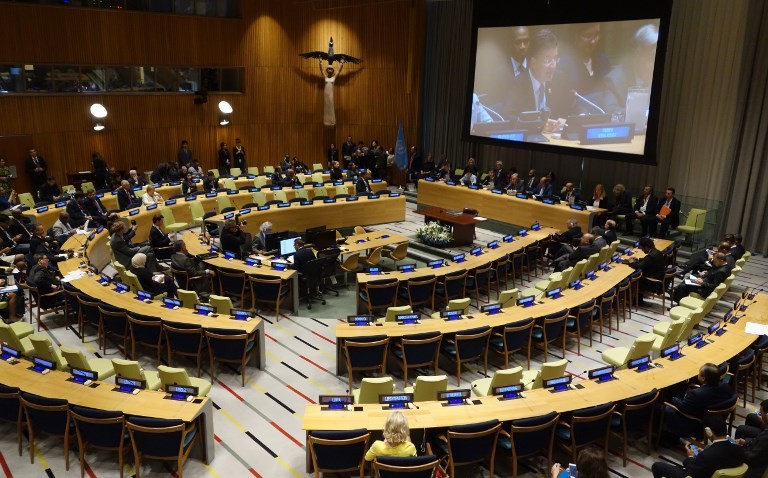Popular Reads
Top Results
Can't find what you're looking for?
View all search resultsPopular Reads
Top Results
Can't find what you're looking for?
View all search resultsIndonesia running in circles in bid to ratify anti-nuclear weapons treaty
Indonesia is still dragging its feet in the ratification of an international treaty to prohibit nuclear weapons that it signed more than three years ago.
Change text size
Gift Premium Articles
to Anyone
Indonesia is still dragging its feet in the ratification of an international treaty to prohibit nuclear weapons that it signed more than three years ago, even as its neighbors have one by one made good on their commitments.
Malaysia was the latest to submit its instrument of ratification of the Treaty on the Prohibition of Nuclear Weapons (TPNW) on Wednesday, making it the 46th country to pass the treaty into law.
Malaysian Foreign Minister Hishammuddin Hussein said the country’s ratification brought the international community one step closer to amassing the 50 national endorsements needed to bring the treaty into force, Bernama reports.
Adopted on July 7, 2017, the treaty prohibits all activities related to nuclear weapons, including their development, testing, manufacturing, acquisition, possession, stockpiling, use and stationing.
In Southeast Asia, Thailand was the first nation to sign and ratify the treaty, only a few months after it was adopted. Vietnam ratified it the following year, followed by Laos in 2019.
Indonesian Foreign Ministry spokesperson Teuku Faizasyah said Indonesia was one of the first 50 countries to sign the treaty in 2017, but the ratification itself was still ongoing.
“Of course, ratification cannot be done instantly, because it involves many stakeholders and progress is currently a bit constrained by the COVID-19 pandemic,” he said on Wednesday.
Foreign Minister Retno Marsudi is expected to participate virtually at the High-Level Meeting on Friday to commemorate and promote the International Day for the Total Elimination of Nuclear Weapons, which fell on Sept. 26.
Muhadi Sugiono, a campaigner for the Nobel Prize-winning International Campaign to Abolish Nuclear Weapons (ICAN), expressed regret that the ratification of the nuclear prohibition treaty had not been made a priority issue in Indonesia’s foreign policy.
Muhadi said he did not understand why it was taking so long for Indonesia to ratify the treaty, given its overall feasibility. The treaty, he noted, did not prohibit the use of nuclear power for peaceful purposes, and the military doctrine in Indonesia had never included the use of nuclear weapons in its arsenal – the government has even firmly opposed its use.
“If implemented, no industry will be harmed by the prohibition. ICAN’s study suggests that there is only one company [in the country] that is suspected of investing in nuclear power, but it isn’t even producing goods,” he told The Jakarta Post on Thursday. “So, there’s virtually no economic impact.”
He further suggested that, with ratification, Indonesia would be showing real leadership in establishing a new international order on disarmament.
Separately, a member of House of Representatives Commission I, which oversees foreign affairs and defense, Dave Laksono, said the treaty had yet to be discussed at the legislature.
“We haven’t had any discussions scheduled. We are waiting for the government to start it,” he told the Post on Wednesday.
The Foreign Ministry's director general for multilateral cooperation, Febrian A. Ruddyard explained that, before it could table it at the House, the government had to form an inter-ministerial committee, discuss academic input and report to the president, so that an initiator could be appointed.
The government has prepared the academic texts to be discussed by the committee, which comprises agencies like the National Nuclear Energy Agency (BATAN), Nuclear Energy Regulatory Agency (Bapeten), the Defense Ministry, the Research and Technology Ministry and the Indonesian Military.
“Besides that, we are now drafting a bill on nuclear security, so at some point of the ratification, we will also have to put this into consideration,” Febrian said.
He emphasized that ratification would affect not just the government but the entire country, and that all Indonesians would be legally bound to respect the treaty.
“So we have to be careful and proper, both procedurally and in terms of substance, as well as in existing provisions in our national laws. That’s why we don’t want to set an artificial timeline,” the ministerial official said. “This is not a matter of speed but a matter of commitment, which is implemented in accordance with our national interests and laws.”
As the de facto leader of ASEAN, Indonesia is expected to shore up resources against global nuclear proliferation, which the bloc collectively agrees to oppose through the Southeast Asia Nuclear Weapon-Free Zone (SEANWFZ) treaty.
As a member of the Non-Aligned Movement (NAM) and a coordinator of its working group on disarmament and nonproliferation since 1994, Indonesia was among cosponsors of the 2017 United Nations General Assembly resolution to enforce the Nuclear Weapons Ban Treaty. Various observers have since called on Indonesia to make good on its advocacy.










